I love Moroccan Food and I could eat it almost every day (although, my hips probably wouldn’t appreciate all that bread). Moroccan food is s...
I love Moroccan Food and I could eat it almost every day (although, my hips probably wouldn’t appreciate all that bread).
Moroccan food is so diverse and vibrant in color and flavor. The flavor combinations, aromatic spices and exotic ingredients make even the most basic dishes amazing. Here are just a few of my favorites.
MOROCCAN FOOD
Moroccan cuisine is very healthy, at least in general. Most dishes contain vegetables and rely on whole grains, freshly prepared food, spices and sweet fruit rather than refined sugar and deep-frying. They use lamb which is leaner than red meat, and couscous which is healthier than rice.
But the health aspect isn’t the only reason I love Moroccan food. The delicious combination of mouth-watering flavors is what makes it unique… Oh, the flavors.
Influenced over thousands of years by Berber, Jewish and Arab cultures, today’s Moroccan food is an exciting blend of spices and textures. The Berber influence is seen in the mobile way of cooking: grilled or slow cooking over hot coals, and breads and dips you can eat with your hands. Arabs introduced lamb, sweets and dates, while Jews brought their pickled lemons and the olives.
1. TAGINE
Morocco’s defining national dish is tagine and it’s one of my favorite Moroccan dishes. Tagine is a clay cooking pot with a conical top, and it’s also the dish that is cooked in said pot. The unique shape of the tagine and the slow-cooking method makes the ingredients (beef, lamb, chicken, veggies, etc.) tender and luscious. Definitely don’t leave Morocco without trying one.
2. COUSCOUS
Couscous is another common Moroccan dish. It’s typically served with meat or vegetables, and like tagine it comes in a number of varieties. Berbers usually put in raisins and serve with a bowl of buttermilk. Another way of serving is covering the meat by a pyramid of couscous with the vegetables pressed into the sides.
Either way, expect to be served a massive portion you won’t come close to finishing.
3. MOROCCAN MINT TEA
Mhhhm, mint tea… Guys, I’m telling you: You can’t visit Morocco without trying the deliciously sweet mint tea – it’s practically the national drink. It’s a green tea base with lots of mint leaves and sugar. No one actually knows how much sugar Moroccans put in their tea, but it’s a lot.
Warning: This tea is borderline addictive.
4. FRESH SEAFOOD
Morocco’s position by the coast means there are lots of fresh fish. Sardines represent more than 62% of the Moroccan fish catch, but anchovies, prawns and mackerel are also common at the fish markets and on the menu cards. The best place to get fresh fish is by the coast, like in Agadir and Essaouira.
5. VEGETARIAN FOOD
We’ve talked a lot about meat, but fear not vegetarians and vegans of the world. Morocco may be known for its (ah-mazing) slow-cooked meat and kebabs, but it’s also famous for its veggie dishes. Every meal is served with salad (cooked or fresh), and most dishes can be cooked without meat, like harira (Moroccan soup), vegetarian tagine and couscous with vegetables. Straight vegetarian dishes include lentils (known as addis) and loubia which is white kidney beans cooked in a tomato based sauce.
6. MOROCCAN SWEETS AND CAKES
Moroccans have a serious sweet tooth and if the sugary, delicious cakes weren’t enough, they often come with a glass of hot, sweet mint tea. Here are some of the best desserts:
- Date truffles (my favorite!) – a delicious blend of dates, nuts and cocoa powder
- Sugared peanuts – buy them at street stalls
- B’stilla – a pigeon pie with almonds and eggs wrapped in paper-thin pastry leaves
- Briouats – deep-fried sweet puff pastry triangles stuffed with almond paste
- Gazelle horns – with almond paste, orange flower water and cinnamon
Calories don’t count on vacation, right?
7. BABA GANOUSH AND HUMUS
Baba ganoush is cooked eggplant mixed with tahini, olive oil, garlic, cumin and black olives, and it’s a common side dish typically served with bread. So is humus, which I absolutely LOVE. The flavor-combination of mashed chickpeas blended with tahini, olive oil, lemon juice, salt and garlic is awesome, especially when served with a pile of fresh pitas. Yum!!
8. MOROCCAN MIXED SALAD
Salads in Morocco are different to what you would expect and generally served with lots of bread. The vegetables are either raw or cooked, hot or cold, flavoured by herbs and spices, and served with a main course such as grills, tagine or couscous.
A popular salad is zaalouk, which is eggplant, tomato and garlic. The carrot salad and tk’toukamade of peppers, tomatoes and spices are also common in Morocco.
9. DATES
So, one big thing. If you go to Morocco, you’re going to see dates for really cheap, everywhere. I’m a total sucker for dates both fresh or in cooking. Just this weekend we made bacon-wrapped dates in the oven, and oh my gosh, talk about wow! They’re such a versatile food, and if you’re a date connoisseur like me, you’ll definitely get a kick out of trying these.
10. SHISH KEBAB
The tasty Moroccan kebabs, also known as brochettes, are found on almost every street corner. The chicken, lamb, or beef kebabs are rubbed in salt and spices, then grilled over charcoal fire. Ooooh….that taste. You have to try the kebabs.
10 Best Moroccan Food You Must Try in Morocco.
1. TAGINE
We had tagine multiple times while in Morocco. It’s a clay cooking pot with a conical lid with multiple types of dishes slow cooked inside (beef, lamb, chicken, veggies, etc). You can get it anywhere (a roadside stop, cafés, nicer restaurants to name a few places).

2. COUSCOUS
Couscous is originally from Morocco and typically served with meat or vegetable stew. Traditionally it’s prepared on the Muslim holy day (Friday) and for special occasions, but you can find it at most restaurants and cafes.

3. ZAALOUK
Zaalouk is a common side dish and typically served with crusty bread. It’s a spread made with eggplants, tomatoes, garlic, olive oil and spices.
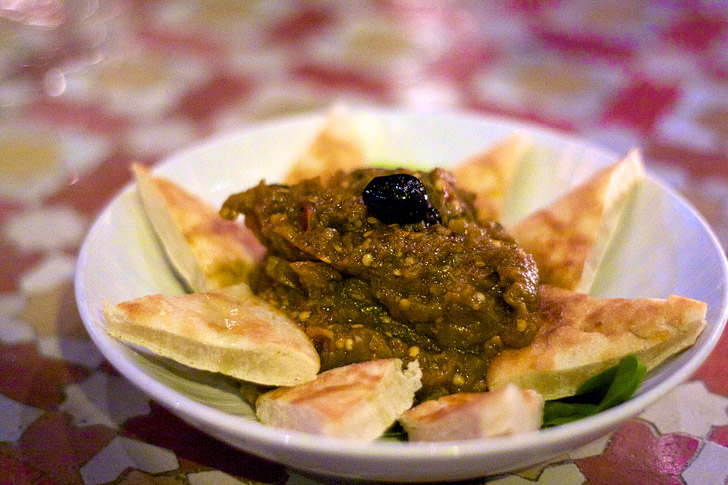
4. FISH CHERMOULA
Chermoula is a mix of herbs and spices used when grilling or baking fish and seafood. Depending on the mix, you’ll get flavors of onion, coriander, chili peppers, or saffron. Often times you’ll see it as a dipping sauce too!

5. HARIRA
This is basically a Moroccan lentil soup usually served as a starter or used during Ramadan to break the fast at dusk.

6. PASTILLA (CHICKEN OR PIGEON PIE)

7. MAKOUDA

Who doesn’t love deep-fried foods? Makouda is a deep-fried potato ball dipped in spicy sauce and definitely a street food staple.
Who doesn’t love deep-fried foods? Makouda is a deep-fried potato ball dipped in spicy sauce and definitely a street food staple.
8. KHOBZ
This crusty bread is typically baked in communal wood-fired ovens and served with a lot of meals. Also, be sure to check out all the other breads in Morocco, like the harcha (a buttery bread), rghaif (a flaky flat bread), or baghira (spongy crumpet).

9. STEAMED SHEEP HEAD
During the festival of Eid al-Adha, everyone slaughters a sheep then steams the head for hours. You can typically purchase a half or whole head and enjoy it with cumin, salt, and chili. The whole head is edible, but the best parts are the tender cheek meat and tongue.
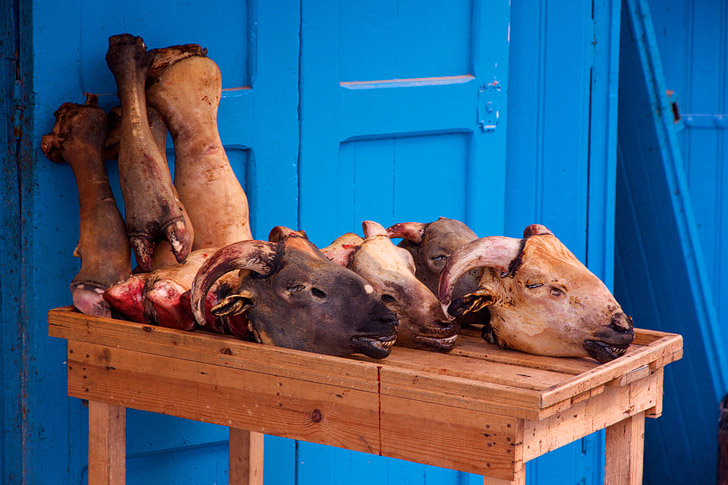
10. SPICY SARDINES
Morocco is the world’s largest exporter of sardines. Naturally, they also serve it all over the country. Stuffed and cooked with a spicy chermoula sauce, they deep fry the fish for a tasty snack.
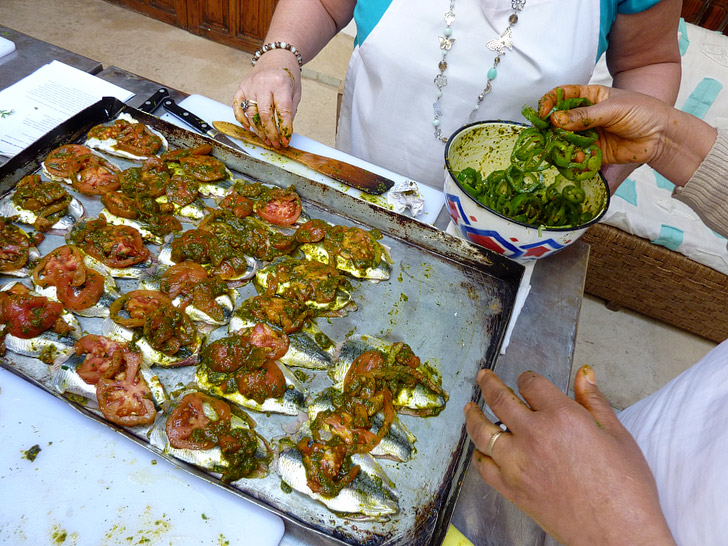
11. MINT TEA
Everyone has his or her own version of mint tea, which is the drink of choice in Morocco. It’s a green tea base with lots of mint leaves and sugar.

12. BISSARA

Commonly served during breakfast, this is a rich and hearty soup made from dried fava beans. Typically it will be topped with fresh olive oil and a sprinkle of cumin.
13. CRUMBED LIVER
You can try this with a side of fries or in a sandwich, but the smooth and buttery calves’ livers is a delicious fried dish.

14. BROCHETTES
These tasty kebabs are rubbed in salt and spices and can be found in a lot of the markets. You can get chicken, lamb, or beef and the enormous clouds of smoke make for great photos.

15. EGGPLANT FRITTERS
Aubergine, or eggplant, is common in a few different dishes in Morocco, but be sure to try the fritters. They slice the eggplant then dip them in a paprika batter before deep-frying them for a delicious side dish.

16. SNAIL SOUP
Snail soup can be found all over Morocco. Use a toothpick to pick out the snails from the shells then slurp up to the soup. Locals believe the broth is good for digestion and fever.

17. STUFFED CAMEL SPLEEN
Taking on the form of a sausage, stuff camel spleen is soft and creamy. It’s usually filled with beef or lamb, olives, spices, and a bit of hump fat. It’s typically served in a sandwich.

18. TANJIA
Tanjia is named after the clay pot that it’s cooked in. It’s traditionally filled with chunks of beef or lamb and a bunch of spices, then slow cooked in the embers of a furnace.
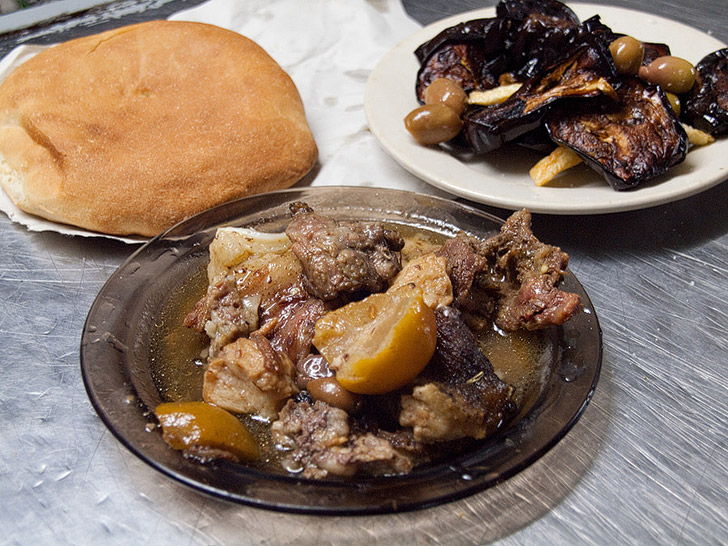
19. KAAB EL GHAZAL
Kaab el Ghazal, or gazelle horns, are crescent-shaped pastries have almond paste scented with orange flower water and cinnamon.
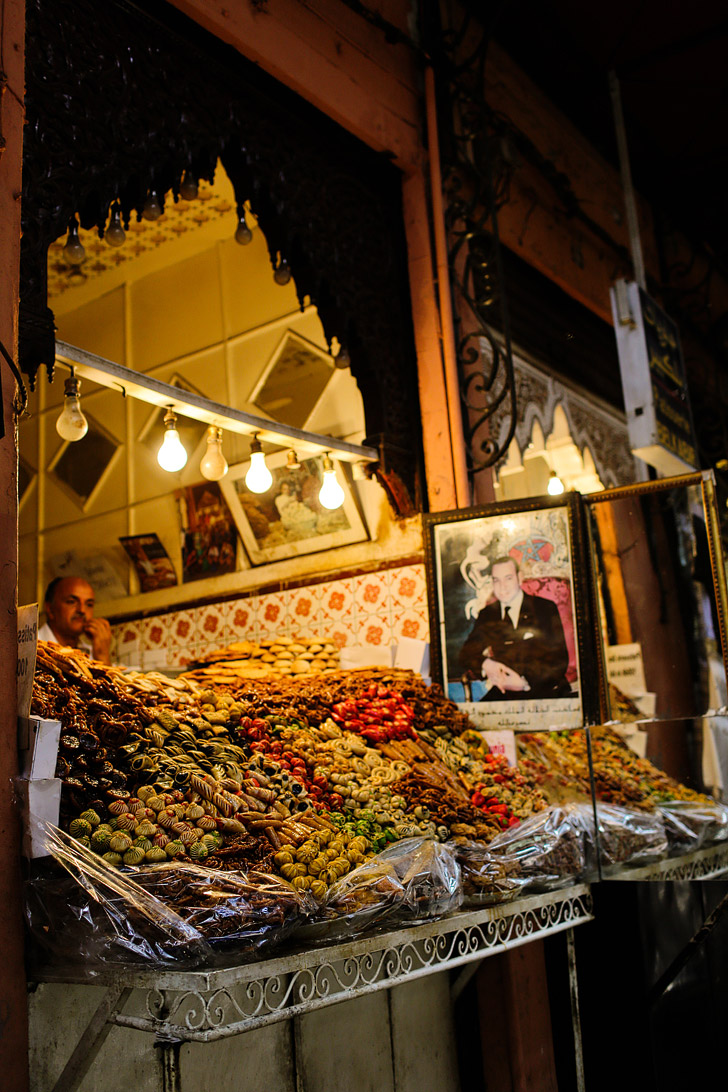
20. BRIWAT OR BRIOUATS
You can’t leave Morocco without having some of the delicious sweets! Briwat is a deep fried filo pastry in the shape of a triangle and filled with almonds.

21. SHEBAKIA
Another delicious dessert, shebakia is a flower-shaped, fried sesame cookie dipped in honey. You’ll usually find bees all over them in the markets, and they just shoo them away before serving them to you. It’s all part of the experience.

BONUS TIP: DON’T FORGET YOUR IMMODIUM
Our favorite Moroccan food!
Tagine

Morocco’s most famous dish is actually named after the conical clay pot in which it’s cooked. A staple in every menu – from roadside stalls to top notch restaurants – tagineconsists of a warm stew of tender meat and vegetables seasoned with a blend of spices and always served with a side of khobz (bread). Slow-cooked chicken with green olives and lemons is arguably the classic base but make sure to try the kefta variety where minced lamb or beef is rolled into balls, cooked in a tomato and onion sauce, and topped with an egg.
B’ssara

When you’re on-the-go in the morning, there’s nothing better than Morocco’s most beloved street food. For a few pennies at a food stall, this hearty soup of dried broad beans will also come with a delicious side of freshly baked khobz. Typically served at breakfast, with olive oil, cumin and sometimes paprika dusted on top, b’ssara is sure to leave you feeling satisfied until lunchtime!
Fish Chermoula

But it’s not all stews and purées: Morocco’s long coastline also means that the national cuisine is filled with tasty fish recipes cooked with the freshest catch of the day. Chermoula is one of the local favorite ways to season it – its tasty combination of herbs and spices is perfect to marinate the fish before grilling or to use as a dipping sauce.
Harira

This traditional Berber soup has many variations throughout Morocco but the most basic recipes will include flour, lentils, chickpeas, tomatoes, a blend of spices, some pieces of lamb or chicken and a squeeze of lemon juice. Usually served as a starter, this hearty soup is actually filling enough to be a meal in itself and it’s traditionally used to break the fast at sunset during RAMADAN
B’stilla

A Fassi (from Fez) specialty, b’stilla is thought to have been originally brought over to Morocco from Andalucía by the Moors. An elaborate pie, b’stilla creates an intriguing mix of salty and sweet with pigeon meat cooked in spices and topped with a layer of toasted and ground almonds and cinnamon, all wrapped in warka pastry. Traditionally served at weddings and other celebrations, b’stilla has also become a street food staple and it’s the ultimate Moroccan sweet-savory combination!
Mint Tea

Jokingly referred to as “Berber whiskey”, mint tea is Morocco’s national drink. It is woven into the country’s most ancient practices of hospitality and serving it is an art form. Gunpowder tea is flavored with sprigs of fresh mint and heavily sweetened with sugar chipped off a sugar cone. It’s usually poured from metal teapots into glasses from a great height to create a bubbly froth called “the crown” which is meant to make it more appealing.
So which dish are you most looking forward to trying? Journey Beyond Travel can help arrange a culinary adventure in Morocco. Stay in beautiful riads with great meals, take a food tour, and enjoy dining under the stars just for starters!
FASCINATING THINGS TO DO IN MARRAKECH MOROCCO
1. SEE THE KOUTOUBIA MOSQUE AND MINARET
The minaret of the Koutoubia Mosque is one of Marrakech’s most famous icons. Although it only sits at 77 meters high, you can see it from near and far. It is still an active place of worship and non-Muslims cannot enter, but you can admire it from the outside.
The Ben Youssef Medersa was founded in the 14th century and was dedicated to the teaching of Islamic scripture and law. Since it’s closure in 1960, it has be refurbished and reopened to the public as historical site in the 80s.
Address: Kaat Benahid, Marrakech 40000, Morocco
Phone: +212 524 44 1893
Hours: 9AM – 6PM Daily
Entrance Fee: 50 Dh

3. SEE THE SAADIAN TOMBS
No expense was spared building this tomb. Italian Carrara marble, intricate platerwork, and pure gold were used to make the Chamber of the 12 Pillars.
Address: Rue de La Kasbah, Marrakesh, Morocco
Hours: 8AM – 4PM Daily
Entrance Fee: 10 Dh

4. EXPLORE THE RUINS OF THE EL BADI PALACE
Built in the 16th century by Saadian King Ahmad al-Mansur, it was later looted by his successor and left as bare ruins. You get amazing views of the Atlas mountains from the terrace and you’ll find that storks have made their home here.
Address: Ksibat Nhass, Marrakesh, Morocco
Hours: 8AM – 5PM Daily
Entrance Fee: 10 Dh

5. JEMAA EL FNA SQUARE
Coordinates: 31.6258 N, 7.9894 W
Hours: Approximately 9AM – 1AM
This is one of the best-known squares in Africa and definitely something you picture when thinking of Marrakech. During the day it’s filled with buskers, orange juice stands, and shops, and in the evening it transforms into a huge outdoor food court.
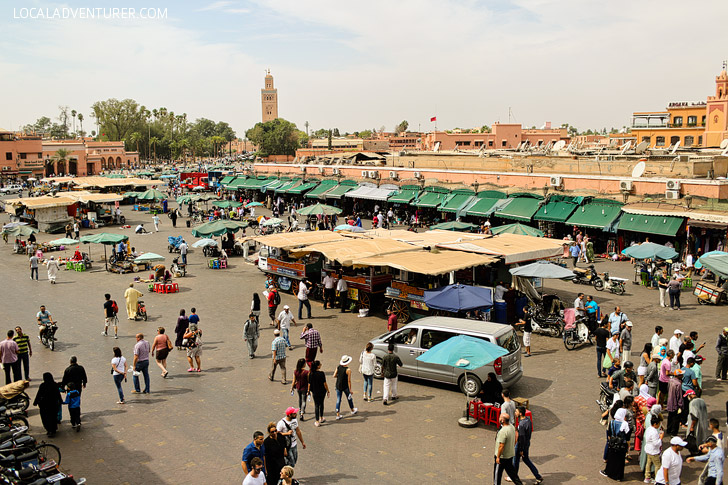
6. MARRAKECH SOUK / MARKETPLACE
Just north of the Jemaa El Fna, there is an intricate maze of alleyways filled with shops. You’ll find everything from everyday goods, to handcrafts, to souvenirs. Be prepared to bargain to get the best prices you can! We couldn’t figure out the actual hours of the marketplace, but when we returned at around 9PM, many shops were starting to close or were closed.
7. TRY THE LOCAL CUISINE
Be sure to try all the local delicacies like tagine, cous-cous, kebabs, snail, sheep’s head, and pigeon pie. Jemaa El Fna turns into a huge food market every night so that’s a great place to get a bit of everything. We ate tagine almost every day.

8. TAKE A STROLL IN JARDIN MAJORELLE
This 12-acre botanical garden is home to an electric blue villa and is the perfect place for stunning photos and a peaceful walk.
Address: Rue Yves Saint Laurent, Marrakesh, Morocco
Phone: +212 524 30 1894

9. MARVEL AT THE BAHIA PALACE / PALAIS DE LA BAHIA
This palace was built in the 19th century and showcases beautiful Arab and Islamic architectural styles. Take in all of the intricate ceilings, colorful tiles, and beautiful lamps.
Address: 5 Rue Riad Zitoun el Jdid, Marrakesh 40000, Morocco
Hours: 8AM – 6PM Daily, Closed Friday
Entrance Fee: 30 Dh
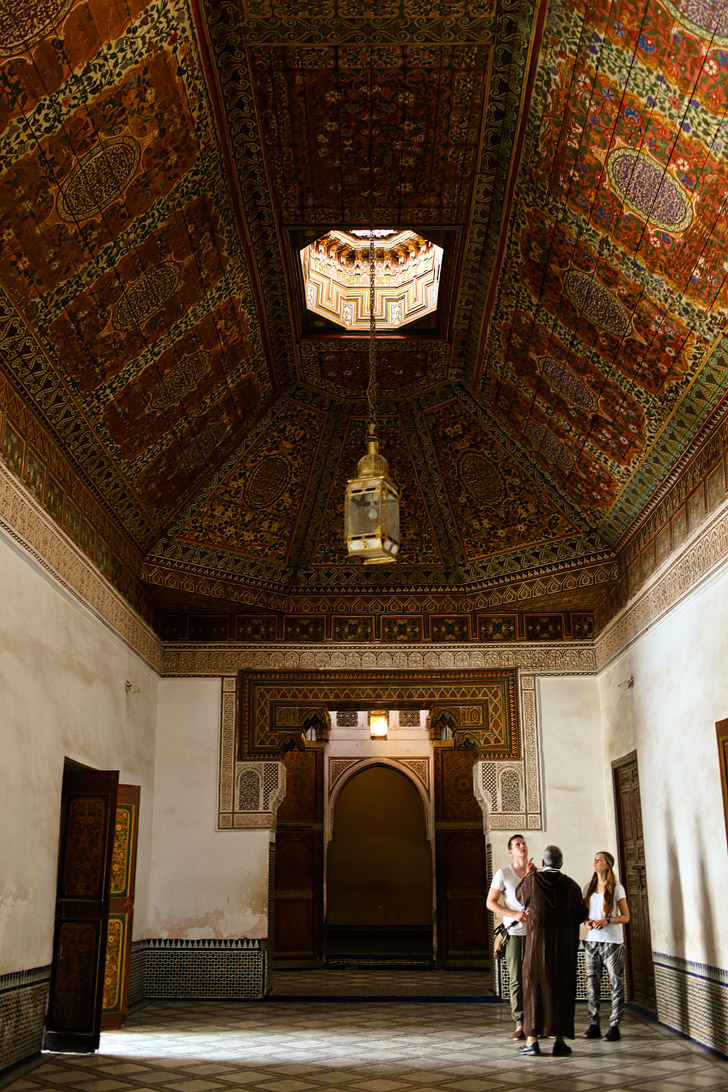
10. MARRAKECH RAILWAY STATION
Even if you’re not planning on using the public transportation, the Marrakech Railway Station is still worth stopping by. The new building that was built in 2008 is truly a grand entrance to the station during the day or night.
11. BELLY DANCING DINNER
You can’t leave Marrakech without enjoying a dinner and show. Although there are many choices, Le Comptoir Darna is one of the most popular spots in town. Be sure to make a reservation ahead of time as it fills up quickly.
Le Comptoir Darna
Address: Avenue Echouhada, Marrakech, Morocco
Phone: +212 524 43 7702
Hours: 7:30PM – 3AM Daily
12. RELAX AT A HAMMAM
Hammam, or public bathhouses, is a great way to experience the local culture and relax at the same time. You can go with high-end hammams and spas at La Mamounia or Selman Hotels, or go for an authentic and thorough scrub down at Hammam Dar el-Bacha.
Hammam Dar el-Bacha
Address: 20 Rue Fatima Zohra, Marrakech, Morocco
Hours: Men 7AM – 1PM, Women 1-9 PM
Entrance Fee: 10 Dh

13. STAY AT HOTEL LA MAMOUNIA
One of the premiere hotels in Marrakech, La Mamounia provides a luxurious stay right outside the Medina. In addition to spectacular service, enjoy their equally famous gardens.
Address: Avenue Prince Moulay Rachid, Marrakech, Morocco
Phone: +212 524 38 8600

14. STAY IN A RIAD
If you’re looking for a real authentic stay, then skip the hotels in Marrakech and stay in a Riad, or traditional Moroccan house within the Medina (Old City). If you’ve already booked a hotel, you can stop by to have some mint tea instead.

15. HAVE A GLASS OF FRESH-SQUEEZED ORANGE JUICE
16. TAKE A CALÈCHE RIDE
You will have plenty of opportunities (and plenty of people trying to convince you) to take a ride on a horse-drawn carriage. But this isn’t just a stroll around the park, you can actually go out into the main streets amongst the cars and traffic. Be sure to bargain and agree to a price before hopping on! When we went, we rode through a sand storm, and it made the ride really interesting. You can see in the video at the bottom of the post.
17. HAVE A GLASS OF MINT TEA
18. SHOP AT A BERBER PHARMACY
Berber Pharmacies come in all shapes and sizes. Some are brightly lit shops with staff wearing white coats, and others look like they came straight out of your imagination with animals in jars and tanks. Wherever you go, you’ll see a lot of the same items: perfumes, skincare, argon oil, spices, soaps, and more.
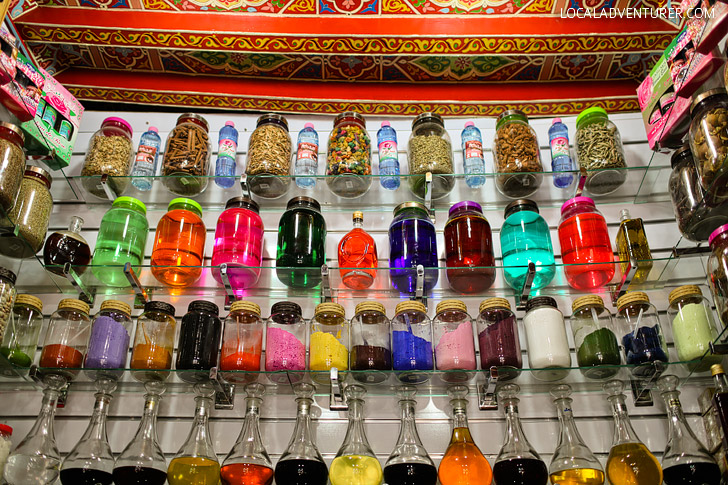
19. MARRAKECH THROUGH MUSEUMS
For a change of scenery, check out the museums. Here are the most popular ones:
Maison de la Photographie: vintage Moroccan photography dating back to 1870
Address: 46 Ahal Fés, Marrakesh, Morocco
Phone: +212 524 38 5721
Hours: 9:30AM – 7PM Daily
Entrance Fee: 40 Dh
Dar Si Said Museum: collection of crafts and woodwork
Address: Riad Zitoun El-Jedid, Marrakesh, Morocco
Phone: +212 524 38 9564
Hours: 9AM – 6:45PM Daily
Entrance Fee: 10 Dh
Douiria Moussine: restored, petite 17th century apartment
Address: 5 Derb El Hammam, Mouassine, Marrakesh, Morocco
Phone: +212 524 38 5721
Hours: 10AM – 6PM Daily
Entrance Fee: 30 Dh
20. RIDE A CAMEL
21. TAKE A DAY TRIP TO EXPLORE THE ATLAS MOUNTAINS
BONUS: SMOKING SHISHA
Shisha, or what you might know as hookah, is a common social activity in Morocco instead of drinking. A lot of restaurants and cafes, and sometimes hotels offer them.

Medical Travel Insurance | How to Travel without worries































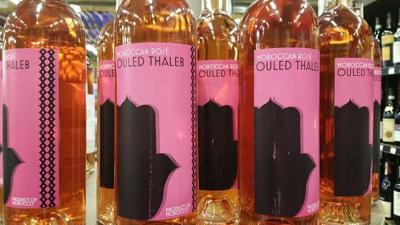











COMMENTS